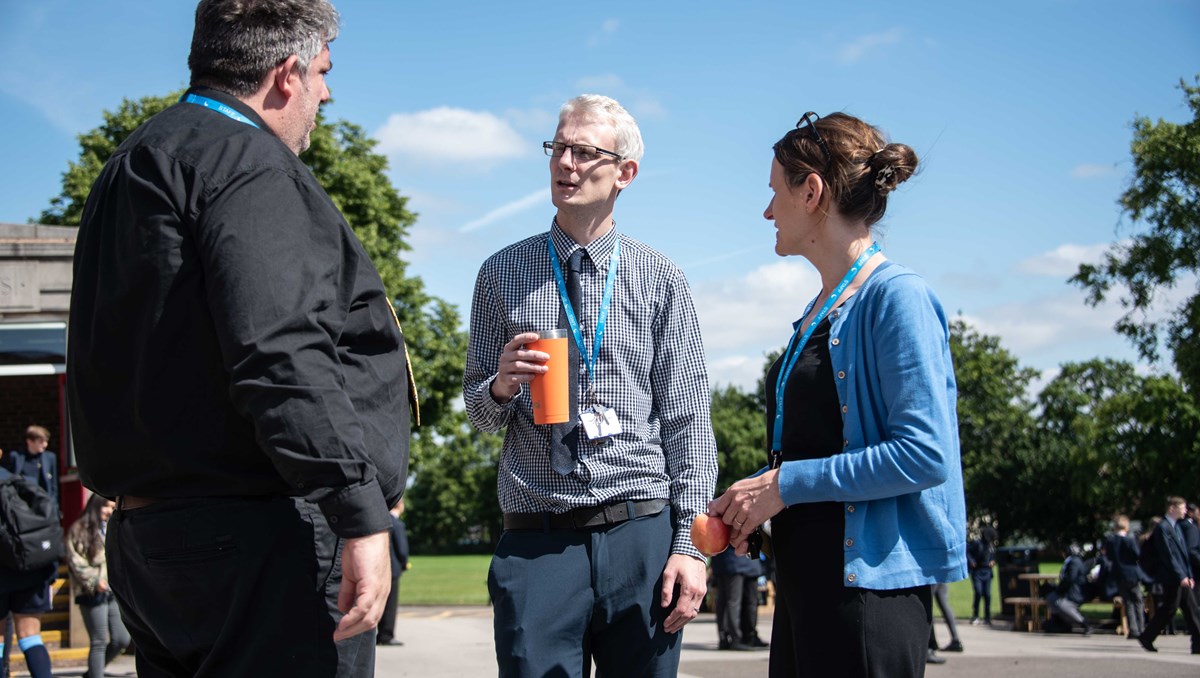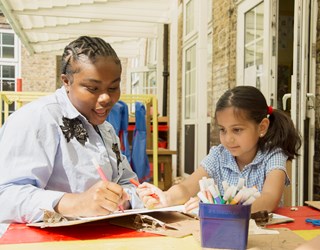Advice for improving your workplace relationships
Leonie Hurrell provides advice for teachers and education staff including top 5 tips on creating healthy working relationships.
Articles / 5 mins read

We spend around a third of our lives at work. Our jobs and careers make a real impact on our overall levels of happiness. Having good work relationships will always make our jobs more enjoyable. In fact, according to research by Gallup, people who have a best friend at work are up to seven times more likely to be engaged in their roles. Seligman (2011) also noted that happiness couldn’t be achieved without social relationships, and while social relationships do not guarantee happiness, happiness does not often occur without them.
Senior leaders in schools who encourage informal interactions can foster the development of more positive relationships. Informal interactions can significantly influence and improve staff satisfaction, creating an atmosphere of trust as well as creating greater opportunities for creativity and innovative thinking.
Also, when we have great workplace relationships we will demonstrate cooperation, trust, and fairness, activating the reward centre of our brains which encourages even more positive interactions.
Connecting with others gives us a sense of inclusion, connection, interaction, safety, and community. Your vibe attracts your tribe, so if you want to attract positive and healthy relationships, be one! Staying connected and getting reconnected feeds the flow of goodness which empowers our humanity.Susan C. Young
Most advice about building a happy career in education focuses on finding purpose and satisfaction in your work. While this is incredibly important, focusing on the relationships that help us through each day is equally vital to our happiness and our schools’ success. Arguably, the quickest way to feel happier and more engaged in your role at school is to spend some time building good relationships.
Creating healthy working relationships
As we know, building good work relationships requires trust, respect and greater self-awareness. These can all be supported through engaging in positive interactions and good communication. Everything at work is created at an intersection between people. So, we need to get those intersections right. There are some simple steps that can help to forge improved working relationships with colleagues:
Tops tips for creating healthy working relationships
1
Focus on self-awareness
This means taking full responsibility for our words and actions, not letting our own negative emotions impact the people around us. If we feel frustration or resentment towards others this will manifest in what we observe and the way we engage. By developing our own Emotional Intelligence, we'll become more adept at identifying and handling our emotions be able to recognise the needs of others. If we view colleagues with compassion and respect, we will improve our interactions and build strong working relationships. What would happen if we stopped making judgments and embraced a positive appraisal of our co-workers? If we saw difference as something valuable that could be harnessed and actually enhance our perception and understanding of those around us? Your vibe will always attract your tribe.
"We don't see things as they are, we see them as we are."
Anaïs Nin
2
Be open and honest
Secondly, all good relationships depend on open, honest communication . Whether you're sending emails or IMs, or meeting face-to-face or on video calls, the more effectively you communicate with those around you, the better you'll connect. It’s important to identify the nature of our relationships with others. What is it that we need and what do our colleagues need from us? Once we know the fundamentals of what we need we can be clear with communicating and better understanding each other’s requirements.
"Clarity and simplicity are the antidotes to complexity and uncertainty’"
General George Casey
3
Practice active listening
Good people skills are essential. How good are you at collaborating, communicating and managing challenge? People respond better to those who truly listen to what they have to say. By practicing active listening , you'll talk less and understand colleagues more and you’ll quickly become trustworthy and have more successful interactions. One key skill we can forget when listening is the power of a good question. Active listening is engaging in what you hear, asking questions such as ‘What would you like to happen?’ How can I help you address that? Shows you listen and you care.
"The biggest communication problem is we do not listen to understand. We listen to reply."
Stephen Covey
4
Avoid bad people skills
Good people skills mean avoiding the bad people skills. Gossip and negativity can ruin any workplace relationships. If you're experiencing challenge with someone in your group, talk to them directly and kindly about the problem, be prepared to listen attentively and objectively. Gossiping or colluding with other colleagues will only aggravate the issues, accelerating mistrust and animosity.
"A lot of problems in the world would disappear if we talked to each other instead of talking about each other."
Anonymous
5
Give praise and feedback
Everyone wants to feel that their work is appreciated and to feel truly valued. Genuinely complimenting the work and actions of those around you is a great way to build relationships. Be honest, precise and authentic when delivering praise. Thank you or a gentle word of encouragement can make all the difference to someone’s day. These positive interactions can have a ripple effect and create a much happier and more successful workplace.
"Employees who report receiving recognition and praise within the last seven days show increased productivity…They’re just more engaged at work."
Tom Rath
Leonie Hurrell is is a former headteacher with over 15 years of senior leadership experience. Since completing her ILM coaching qualification in 2015, Leonie founded The Thinking Academy providing ILM recognised coaching training and one to one coaching support in schools across England. She has worked as a freelance Educational Facilitator specialising in leadership development, learning culture, emotional wellbeing and coaching. She regularly supports aspiring headteachers on NPQ leadership programmes as an approved Coach and is an Associate for the charity Education Support, which supports the mental health of teachers in the UK.
Don’t wait for a crisis to call.
We’ll offer you immediate, emotional support.
08000 562 561

Sign up to our newsletter for the latest mental heath and wellbeing resources, news and events straight to your inbox.





















